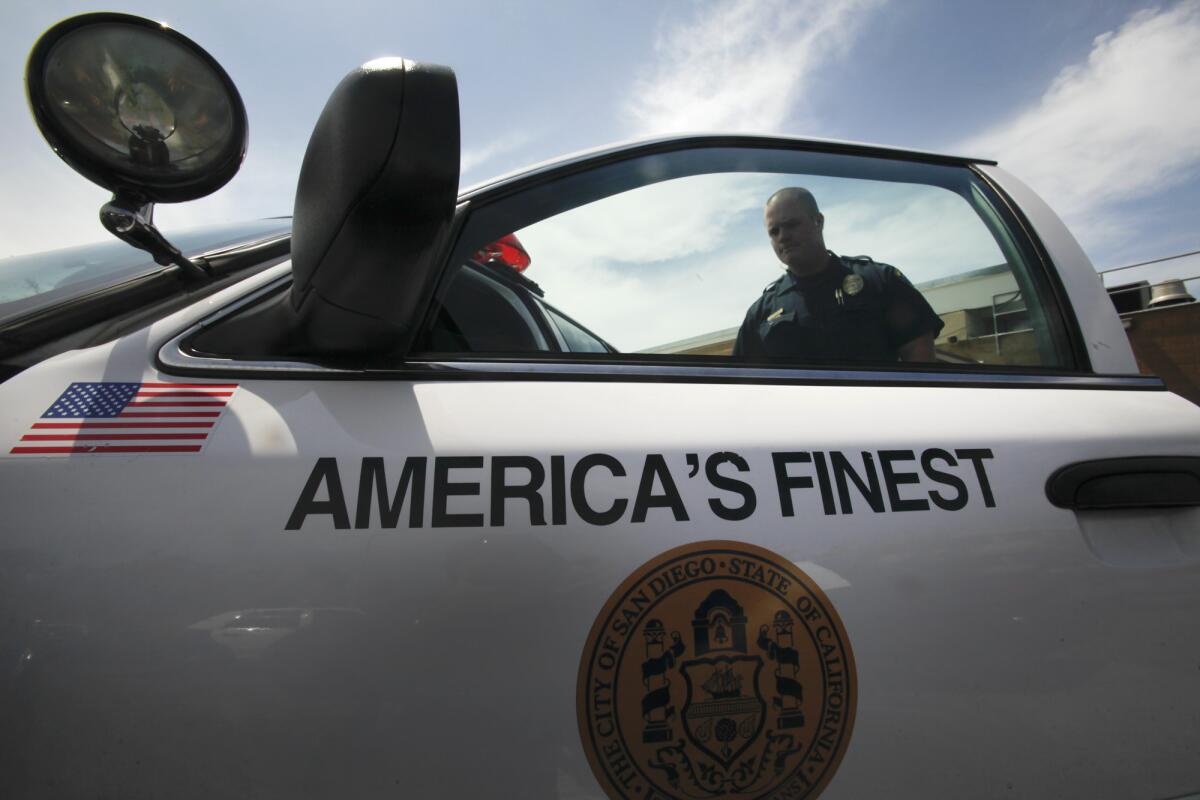Hiring, supervision flaws cited in San Diego Police Department

Reporting from San Diego — Failures in the hiring and supervision of San Diego police led to a series of misconduct cases but the Police Department remains “progressive, sound and very effective,” according to a federal review released Tuesday.
Many of the department’s problems can be traced to the city’s ongoing financial problems that led to a lack of personnel, inadequate supervision and poor communication between various levels of command, said Ronald Davis, director of the Department of Justice’s Office of Community Oriented Policing Services.
The department has had “a failure of leadership at many levels” that caused a “failure to hold people accountable,” Davis said.
The report contains 40 recommendations, many of which have been implemented in the last year, under former Chief Bill Lansdowne and current Chief Shelley Zimmerman, with the support of Mayor Kevin Faulconer and the City Council.
The recommendations include more rigorous background checks of police applicants, a consistent hiring process, more openness with community groups, a quicker and more in-depth review of citizen complaints, and better supervision of officers by sergeants and lieutenants.
“The good news is that we are already making progress on many of the recommendations,” Faulconer said. “The job of building community trust and cooperation is never done.”
Brian Marvel, president of the San Diego Police Officers Assn., said that given a decade of budget cuts, severe constraints on hiring, and the declining morale among officers, it would be “naive...to assume there wouldn’t be the types of negative consequences” mentioned in the report.
No single failure led to the 17 cases of misconduct over five years that were examined, Davis said. The review -- a managerial audit, not a criminal investigation -- was requested 12 months ago by San Diego city officials, including Lansdowne, Zimmerman and Faulconer.
Only a handful of departments in the country have asked for such a review, Davis said. Zimmerman said she supports all the recommendations.
A key criticism in the report involved a failure to detect problem officers at the earliest moment. The system meant to do that was ineffective, the report said.
For example, the report said, in many cases a sergeant will see an officer under his command only once a week.
“We are completely revamping that system,” Zimmerman said. “That’s one that’s going to take some time and some money.”
Immediate response to the report from city officials was positive.
“I look forward to additional measures for true accountability and transparency that will help rebuild the trust that was tarnished by the egregious and illegal acts by some and the poor management by others,” said Councilman Todd Gloria.
A staff attorney for the American Civil Liberties Union said that while the recommendations seem good, the report was “too narrow to be a real comprehensive review of the department.”
ACLU attorney Kellen Russoniello said the report’s “failure to address broader issues such as racial bias in policing is inexplicable” in the aftermath of recent incidents in New York and Ferguson, Mo.
He noted that a recent study of traffic stops in San Diego showed that black and Latino drivers are stopped, and searched, in high percentages -- but that that issue is not addressed in the report.
Zimmerman, a 30-year veteran of the department, has warned officers against racial profiling in traffic stops and taken a tough stand against officers “guilty of misconduct and betrayal of our badge and profession.”
She has visited dozens of community gatherings in hopes of regaining trust for the department damaged by the misconduct cases that include off-duty domestic violence and drunk driving as well as on-duty sexual assault of female motorists.
Among the changes made in the last year: An increasing number of patrol officers are wearing body cameras and a professional standards unit has been reestablished to investigate potential misconduct. Officers have been warned to report potential misconduct by others, that the “blue wall of silence” will not be permitted.
More sergeants have been promoted to enhance supervision. Officers have been told not to routinely ask motorists during traffic stops if they are on parole or probation. They have also been told not to order them to sit on the curb during questioning.
Whenever a woman is taken into custody, two officers must be in the police car.
Anthony Arevalos was an 18-year veteran of the department sentenced in 2012 to eight years in prison for demanding sexual favors from women stopped for driving infractions.
“I never want to see another Anthony Arevalos be employed by us or any other city,” City Atty. Jan Goldsmith said at the news conference at which the report was released.
At the behest of the Department of Justice’s Office of Community Oriented Policing Services, the review was done by the private, nonprofit group Police Executive Research Forum, which has done numerous studies of policy and tactical issues involving law enforcement in the United States.
Twitter: @LATsandiego
More to Read
Sign up for Essential California
The most important California stories and recommendations in your inbox every morning.
You may occasionally receive promotional content from the Los Angeles Times.










